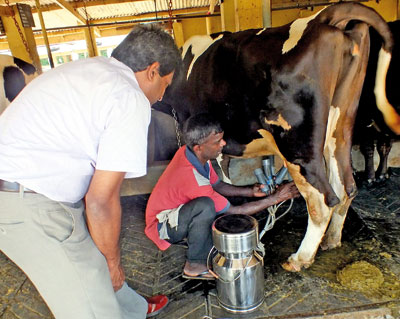No grass – no milk
With reference to journalist Quintus Perera’s report last week in the Business Times headlined “Milk in crisis: Regulators unaware that butter is made from milk!” on the challenges to the dairy industry, in my view the greatest challenge is lack of fodder (grass).
The cattle population in 1964 was estimated at 1.5 million head which had reduced to one million subsequently and remains so up to-date. Only 25 per cent of the national herd gives milk: Here are some other key points:
- What has happened to the heifer (female) calves born over the 30 years? Why was there no increase in the herd?
- If the heifer calves that were born had been fed and looked after properly there would have been 96 million cows as at date, even after giving generous allowance for culling and deaths.
- At the present average production of 2.32 litres per cow per day only 600,000 more cows are required to be self sufficient in milk. At present there are 280,250 cows which produce 1/3 of the amount of the national requirement.
- No quality grass is available in the growth cycle of a calf.
- Total amount of grass available in the country is 1.771 million MT per year (Livestock Development Ministry – Master Plan of Development 2011) compared to the required amount for all ruminant live stock which is 4,077 million MT.
- If there is a sudden reduction in feed (grass) and nutrition, the milk yield will drop and will never come up to the former level in the milk curve (Wellard Report on Sri Lanka 2008).
- There is plenty of land available for grass cultivation, which is the second most profitable crop (next to potatoes in Sri Lanka according to the Department of Animal Health and Production. This is especially so with the state-owned properties plantation companies which are running at a great loss.
- No emphasis is given to legumes when the price of concentrates are exorbitant thus making dairy farming non profitable.
My view is that grass should be treated as a crop in Sri Lanka as it’s vital for the growth of the cattle population.
Gamini Weerasinghe
(Writer is a former Deputy Director General of SLSPC, Director of JEDB and Consultant NLDB. Email: gamiweera@gmail.com)


Adapted from Table 1 on Page 8 of the five year Livestock Master Plan ( 2011) of the Ministry of Livestock Development


